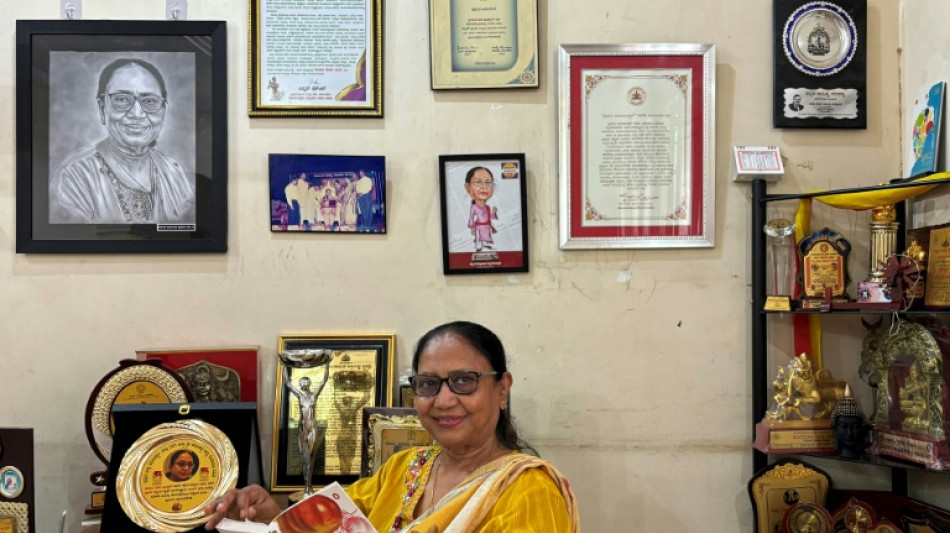
-
 German finds 15mn-euro winning lotto ticket in coat
German finds 15mn-euro winning lotto ticket in coat
-
Injury retirements hit China Open but Sinner reaches semis unscathed
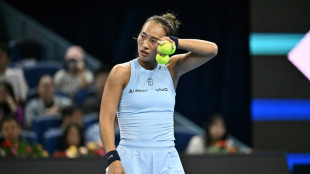
-
 TotalEnergies to boost output, cut $7.5 bn in costs
TotalEnergies to boost output, cut $7.5 bn in costs
-
World Rugby unfazed over England dominance of women's game

-
 Bruised Real Madrid still defining spirit, personality: Alonso
Bruised Real Madrid still defining spirit, personality: Alonso
-
Dolly Parton scraps Vegas shows over health issues
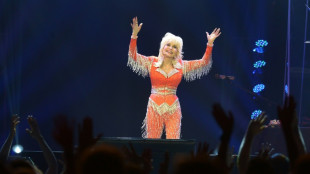
-
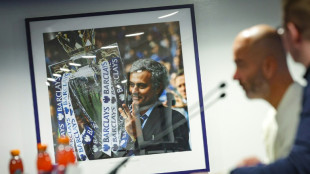 Maresca says 'no panic' at Chelsea despite mini-slump
Maresca says 'no panic' at Chelsea despite mini-slump
-
FIFPro sounds alarm over 'extreme' conditions at 2026 World Cup

-
 Jaguar Land Rover to partly resume output after cyberattack
Jaguar Land Rover to partly resume output after cyberattack
-
Springboks recall De Jager after Mostert withdraws

-
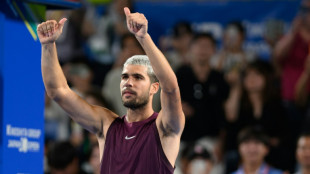 Alcaraz fights back in Tokyo to emulate Nadal with 10th final of season
Alcaraz fights back in Tokyo to emulate Nadal with 10th final of season
-
England bowler Woakes retires from international cricket

-
 UK plans tougher rules for migrants seeking to stay in country
UK plans tougher rules for migrants seeking to stay in country
-
Jailed Thai ex-PM Thaksin requests royal pardon: lawyer

-
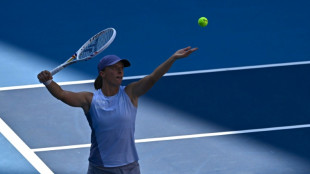 Swiatek says may flout 'crazy' rules to protect health
Swiatek says may flout 'crazy' rules to protect health
-
Paris Olympics and Paralympics cost French state 6.6bn euros: audit body
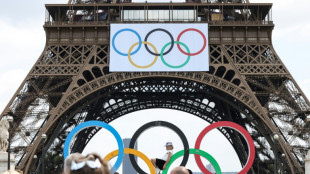
-
 Rooney says he has 'no faith' that Amorim can revive Man Utd
Rooney says he has 'no faith' that Amorim can revive Man Utd
-
'Are you watching Donald Trump?': Europe's Ryder Cup golfers taunt president

-
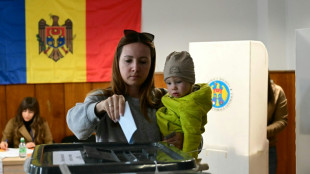 Moldova's pro-EU party hails poll win despite 'dirty' Russian tactics
Moldova's pro-EU party hails poll win despite 'dirty' Russian tactics
-
Typhoon Bualoi kills dozens in Vietnam and Philippines

-
 Wallabies' big-man Skelton ready to impose himself against All Blacks
Wallabies' big-man Skelton ready to impose himself against All Blacks
-
Robertson wants All Blacks to 'pressure' Wallabies in rematch

-
 Sinner cruises into China Open semi-finals as Swiatek moves on
Sinner cruises into China Open semi-finals as Swiatek moves on
-
GSK switches CEO as Trump tariffs test pharma
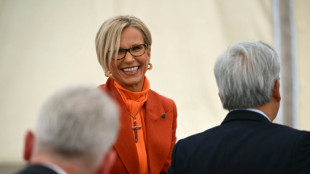
-
 Trump to push Netanyahu on Gaza peace plan at White House
Trump to push Netanyahu on Gaza peace plan at White House
-
Most markets track Wall St gains after US inflation data

-
 Typhoon Bualoi batters Vietnam coast, killing 11
Typhoon Bualoi batters Vietnam coast, killing 11
-
Germany's Lufthansa to slash 4,000 jobs by 2030

-
 Moldova's pro-EU party wins key polls after Russian meddling claims
Moldova's pro-EU party wins key polls after Russian meddling claims
-
Mourinho Chelsea return prompts old memories, mixed feelings

-
 'Predators': how reality TV explains Epstein obsession
'Predators': how reality TV explains Epstein obsession
-
Most Asian markets track Wall St higher after US inflation data

-
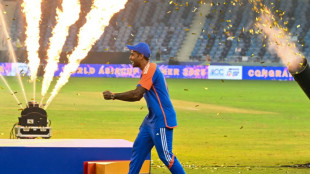 India, Pakistan trade accusations after Asia Cup trophy debacle
India, Pakistan trade accusations after Asia Cup trophy debacle
-
Power-packed Australia favourites to rewrite World Cup history
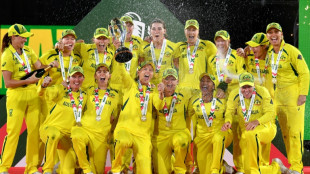
-
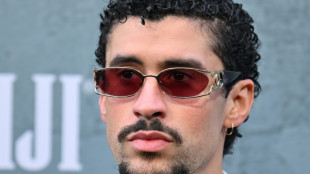 Latin artist Bad Bunny to headline Super Bowl half-time show
Latin artist Bad Bunny to headline Super Bowl half-time show
-
Air France, Airbus back on trial over doomed 2009 Rio flight

-
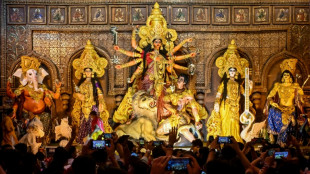 India's divine designs meld with AI at Durga Puja festival
India's divine designs meld with AI at Durga Puja festival
-
Donald won't rule out Ryder Cup captain return after Europe win
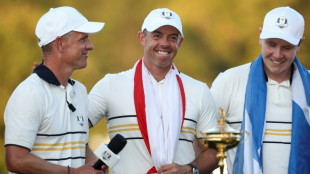
-
 Who is Matthieu Blazy, the new man at Chanel?
Who is Matthieu Blazy, the new man at Chanel?
-
'New chapter': Paris Fashion Week to showcase industry makeover

-
 Bradley on US Ryder Cup loss: 'This is no one's fault but mine'
Bradley on US Ryder Cup loss: 'This is no one's fault but mine'
-
Four killed in attack on northern US Mormon church

-
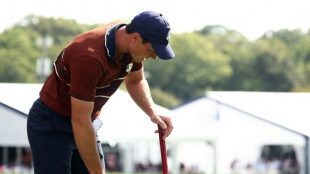 Bradley calls for Ryder Cup rule change for injuries
Bradley calls for Ryder Cup rule change for injuries
-
McIlroy slams 'unacceptable' Ryder Cup heckling

-
 Embattled Australia telco giant hit by another major outage
Embattled Australia telco giant hit by another major outage
-
31 Concept Accelerates Next-Gen DPI Leadership With Strategic Acquisition of Xynthor AI

-
 Mahomes leads resurgent Chiefs in Ravens rout, Eagles stay unbeaten
Mahomes leads resurgent Chiefs in Ravens rout, Eagles stay unbeaten
-
Moldova's pro-EU party tops polls hit by Russian meddling claims

-
 Europe win emotional Ryder Cup triumph after US fightback
Europe win emotional Ryder Cup triumph after US fightback
-
Two dead after shooting, fire at US Mormon church


Petals and thorns: India's Booker prize author Banu Mushtaq
All writers draw on their experience, whether consciously or not, says Indian author Banu Mushtaq -- including the titular tale of attempted self-immolation in her International Booker Prize-winning short story collection.
Mushtaq, who won the coveted literature prize as the first author writing in Kannada -- an Indian regional language -- said the author's responsibility is to reflect the truth.
"You cannot simply write describing a rose," said the 77-year-old, who is also a lawyer and activist.
"You cannot say it has got such a fragrance, such petals, such colour. You have to write about the thorns also. It is your responsibility, and you have to do it."
Her book "Heart Lamp", a collection of 12 powerful short stories, is also her first book translated into English, with the prize shared with her translator Deepa Bhasthi.
Critics praised the collection for its dry and gentle humour, and its searing commentary on the patriarchy, caste and religion.
Mushtaq has carved an alternative path in life, challenging societal restrictions and perceptions.
As a young girl worried about her future, she said she started writing to improve her "chances of marriage".
Born into a Muslim family in 1948, she studied in Kannada, which is spoken mostly in India's southern Karnataka state by around 43 million people, rather than Urdu, the language of Islamic texts in India and which most Muslim girls learnt.
She attended college, and worked as a journalist and also as a high school teacher.
- 'Confused' -
But after marrying for love, Mushtaq found her life constricted.
"I was not allowed to have any intellectual activities. I was not allowed to write," she said.
"I was in that vacuum. That harmed me."
She recounted how as a young mother aged around 27 with possible postpartum depression, and ground down by domestic life, had doused petrol on herself and on the "spur of a moment" readied to set herself on fire.
Her husband rushed to her with their three-month-old daughter.
"He took the baby and put her on my feet, and he drew my attention to her and he hugged me, and he stopped me," Mushtaq told AFP.
The experience is nearly mirrored in her book -- in its case, the protagonist is stopped by her daughter.
"People get confused that it might be my life," the writer said.
Explaining that while not her exact story, "consciously or subconsciously, something of the author, it reflects in her or his writing".
Books line the walls in Mushtaq's home, in the small southern Indian town of Hassan.
Her many awards and certificates -- including a replica of the Booker prize she won in London in May -- are also on display.
She joked that she was born to write -- at least that is what a Hindu astrological birth chart said about her future.
"I don't know how it was there, but I have seen the birth chart," Mushtaq said with a laugh, speaking in English.
The award has changed her life "in a positive way", she added, while noting the fame has been a little overwhelming.
"I am not against the people, I love people," she said referring to the stream of visitors she gets to her home.
"But with this, a lot of prominence is given to me, and I don't have any time for writing. I feel something odd... Writing gives me a lot of pleasure, a lot of relief."
- 'Patriarchy everywhere' -
Mushtaq's body of work spans six short story collections, an essay collection and poetry.
The stories in "Heart Lamp" were chosen from the six short story collections, dating back to 1990.
The Booker jury hailed her characters -– from spirited grandmothers to bumbling religious clerics –- as "astonishing portraits of survival and resilience".
The stories portray Muslim women going through terrible experiences, including domestic violence, the death of children and extramarital affairs.
Mushtaq said that while the main characters in her books are all Muslim women, the issues are universal.
"They (women) suffer this type of suppression and this type of exploitation, this type of patriarchy everywhere," she said. "A woman is a woman, all over the world."
While accepting that even the people for whom she writes may not like her work, Mushtaq said she remained dedicated to providing wider truths.
"I have to say what is necessary for the society," she said.
"The writer is always pro-people... With the people, and for the people."
T.Egger--VB
